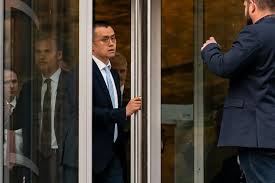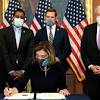Trump's savage attack on Zelenskyy shaped by pro-Russian coterie

 View image in fullscreen
View image in fullscreen
Trump’s savage attack on Zelenskyy shaped by pro-Russian coterie
‘Kremlin whisperers’ have the president’s ear and dissenters are few – but a thin skin and self-interest are also at play
Donald Trump’s tarring of Volodymyr Zelenskyy as a “dictator” who is to blame for the war with Russia, plunging Ukraine into a Darwinian struggle for its very existence, landed like a bombshell on the diplomatic landscape. But it did not come out of nowhere.
The US president has left the already badly frayed western alliance in disarray with a devastating social media attack on his Ukrainian counterpart, just hours after he had already implicitly blamed Kyiv for Russia’s invasion.
After much of what he said appeared to echo Kremlin talking points, including falsehoods about Zelenskyy’s popularity being at 4% (a recent poll put it at 57%), Ukraine’s president attributed it to Trump being trapped in a Russian “disinformation bubble”.
In fact, Trump may be the author of his own misconceptions about Ukraine – or at least responsible for having built the bubble himself, by surrounding himself with prominent figures who have often seemed to echo the Russian line.
A year before he left European leaders mortified at last week’s Munich security conference by accusing them of threatening their own democracies with supposed free speech restrictions, JD Vance – now Trump’s vice-president – was already questioning military support for Ukraine.
“How long is this expected to go on? How much is it expected to cost?” he said, complaining of a “lack of strategic clarity” in US and allied goals.
It was one of Vance’s milder comments. Last year he labelled Zelenskyy “disgraceful” when he visited Washington last year to lobby Congress for military aid, and days before Russia’s invasion in February 2022 he told Trump’s former aide Steve Bannon he did not “really care what happens to Ukraine, one way or the other”.
As stories emerged of Russian atrocities, he doubled down, telling Bannon: “I don’t care enough about what’s going on over there that I’m going to step in, get a bunch of our citizens killed and pour more and more money into the war sinkhole.”
Other members of Trump’s inner circle long associated with a pro-Russian viewpoint also include Tulsi Gabbard, newly confirmed as director of national intelligence, and Tucker Carlson, the former Fox News host who remains one of the president’s most influential backers.
Gabbard has been accused of parroting Kremlin talking points and was challenged on the subject at her recent Senate confirmation hearings – particularly her decision to blame the Russian invasion on Ukraine, as Trump has now done.
“This war and suffering could have easily been avoided if Biden admin/Nato had simply acknowledged Russia’s legitimate security concerns,” she wrote, as Russian missiles struck Ukrainian cities.
Carlson, meanwhile, conducted a face-to-face interview with Vladimir Putin last year as the war raged, which some commentators said the Russian leader used to broadcast a message to Trump and other US conservatives. Carlson was ridiculed for a Pravda-esque video segment praising Russian supermarkets for having coin-operated shopping trolleys, which all western supermarkets have had for decades.
In fact when Pete Hegseth, Trump’s new defence secretary, gave a speech shortly after Vance’s in which he said the US would no longer be “primarily focused” on European security and that Ukraine would never be allowed to join Nato – appearing to simply hand Russia key concessions in the negotiations over ending the war without getting anything in return – he was condemned by the Republican senator Roger Wicker, chair of the Senate’s powerful armed services committee.
“I don’t know who wrote the speech – it is the kind of thing Tucker Carlson could have written, and Carlson is a fool,” Wicker said.
But Wicker – and recently Mike Pence, Trump’s former vice-president, who wrote on social media, “Mr President, Ukraine did not ‘start’ this war” – are rare Republican voices of dissent. The Reaganite hawks from Trump’s first term such as Pence, Liz Cheney or Adam Kinzinger, who might have advised a US president to hold the line against Russian expansionism into Europe, have been purged.
Regardless, Trump may need little outside prompting to feel friendly towards Russia, or Putin, for whom he has long displayed personal admiration. Russian interference on Trump’s behalf during his victorious 2016 presidential election campaign against Hillary Clinton was well-documented by the US intelligence community – and Trump has since developed a hatred of those agencies such as the FBI and CIA, who pointed it out.
 View image in fullscreen
View image in fullscreen
In particular, an inquiry conducted by the special counsel, Robert Mueller, into alleged collusion between the campaign and Russia, was bitterly resented by Trump, who denounced the allegations as a “hoax”.
And in 2019 Trump attempted to pressure Zelenskyy to launch an investigation into Joe Biden and the business interests of his son, Hunter, in Ukraine, in return for US military assistance – an apparently clear abuse of presidential power for Trump’s personal political gain, and which led to his first impeachment.
What’s more, his new righthand man Elon Musk, who supported Ukraine with Starlink satellite service to help repel Russia’s invasion, tangled with Zelenskyy in 2022 after suggesting Ukraine abandon Crimea permanently to Russia and drop its ambitions to join Nato. In recent days, Musk has targeted Zelenskyy on social media in personal terms – perhaps providing the inspiration for Trump’s dismissal of the Ukrainian president as “a modestly successful comedian”.
Yet the causes of Trump’s latest breach with Zelenskyy are equally likely to be immediate and devoid of outside influences, said Charles Kupchan, a fellow at the Council of Foreign Relations.
“Part of it is Mr Trump’s thin skin and his response to what he sees as criticism,” said Kupchan, a member of the White House national security staff in the Obama and Clinton administrations.
“I think he sees himself as going out and trying to help Europe and help Ukraine – and instead, he’s been met with a wave of criticism. And I see his calling Zelenskyy a dictator, blaming him for starting the war, as a kind of impulsive, angry response.”
Kupchan believes that given Trump’s whims, the relationship could be suddenly repaired under pressure of self-interest.
“Trump’s relationship with leaders blows hot and cold. He’s had good meetings with Zelenskyy,” he said. “If you look at Trump’s history, one day he’s good buddies with Macron and then they fall out. I don’t think there is an enduring nature to Trump’s relationships with foreign heads. It’s very much: what have you done for me today?
“At the end of the day, Trump wants a deal to end the war. If he’s going to get that, he needs a working relationship with Zelenskyy … If Trump goes over the heads of Zelenskyy and European allies, to cut some kind of deal with Putin, it will not stick.”
- Trump administration
- Donald Trump
- Russia
- Europe
- US politics
- Ukraine
- US foreign policy
- news


 United Kingdom
United Kingdom Argentina
Argentina  Australia
Australia  Austria
Austria  Brazil
Brazil  Canada
Canada  Germany
Germany  Ireland
Ireland  Italy
Italy  Malaysia
Malaysia  Mexico
Mexico  New Zealand
New Zealand  Poland
Poland  South Africa
South Africa  United States
United States 




















